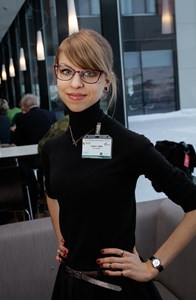I knew early on that I wanted to explore what the world had to offer in terms of both education and life. Even before starting University I was exposed to international education through my Russian classes in Tromsø. Our school trip to Murmansk paved the way for many years of academic nomadism. When moving away from my parents in Bodø and Tromsø for the first time, I went south: via Cuba, almost as far south as I possibly could go, to Australia.
I received a BA in International Studies from RMIT University in Melbourne. However, even though this was already, technically, "abroad" for me, I also went on exchange to Toronto, Canada. There my whole semester consisted of only optional modules, meaning that I could pick and choose among several fascinating courses not offered at my own institution Down Under (as long as they were somehow, tenuously related to my degree). Consequently, my time in Canada had me running between classes as wide-ranging as gender studies, fantasy literature, and immigration policy. If one thing is certain, going on exchange truly broadened my horizon.
Having completed my BA, I went on to do a MSc in International Relations at the University of Edinburgh in the United Kingdom. Perhaps it was the experience of trying to explain where I was from to people who could not name Norwegian towns but had all heard of the Arctic Circle that prompted my choice of dissertation topic. Gradually I started asking myself what it means to come from an Arctic state, and in turn, how our identity influences politics in the North.

Photo: Ole-Tommy Pedersen
While my research showed that Arctic identity among young Norwegians is highly contextual, contingent on whom one defines oneself against, my own Arctic involvement only grew after the completion of my Master’s degree. Employed as a trainee at the North Norway European Office in Brussels, Belgium, I got first-hand experience of policy development (indeed, Arctic policy!). The question then arose: if the population of an Arctic state only sometimes feels like Arctic citizens, what about those enacting these policies, the political decision makers?
This was the question that motivated me to pursue doctoral studies in Human Geography at Durham University in the United Kingdom. This is so far the only UArctic institution in England, and I feel like I have found an Arctic research community away from my northern home. Across disciplines - from Mediaeval Literature to Archaeology to Glaciology (to mention just a few!) – there is a high level of Arctic expertise here in England’s own north.
As I am now entering the last year of my PhD, I have completed fieldwork in Norway, Iceland, and Canada. I have also had the opportunity to travel for both learning and teaching; for example, I was lucky enough to meet fellow UArctic students in Umeå, Sweden, during the 2015 Students’ Forum, and participated in an Arctic-themed summer school at the University of Oslo in 2014.
As students and researchers from both within and beyond the Arctic, I believe it is our shared passion for the Circumpolar North that brings us together across disciplines and borders. It may have taken me many years in the South to realise, but in the final stages of my PhD it is precisely my own attachment to the North that I have discovered.
Published in 2015.
